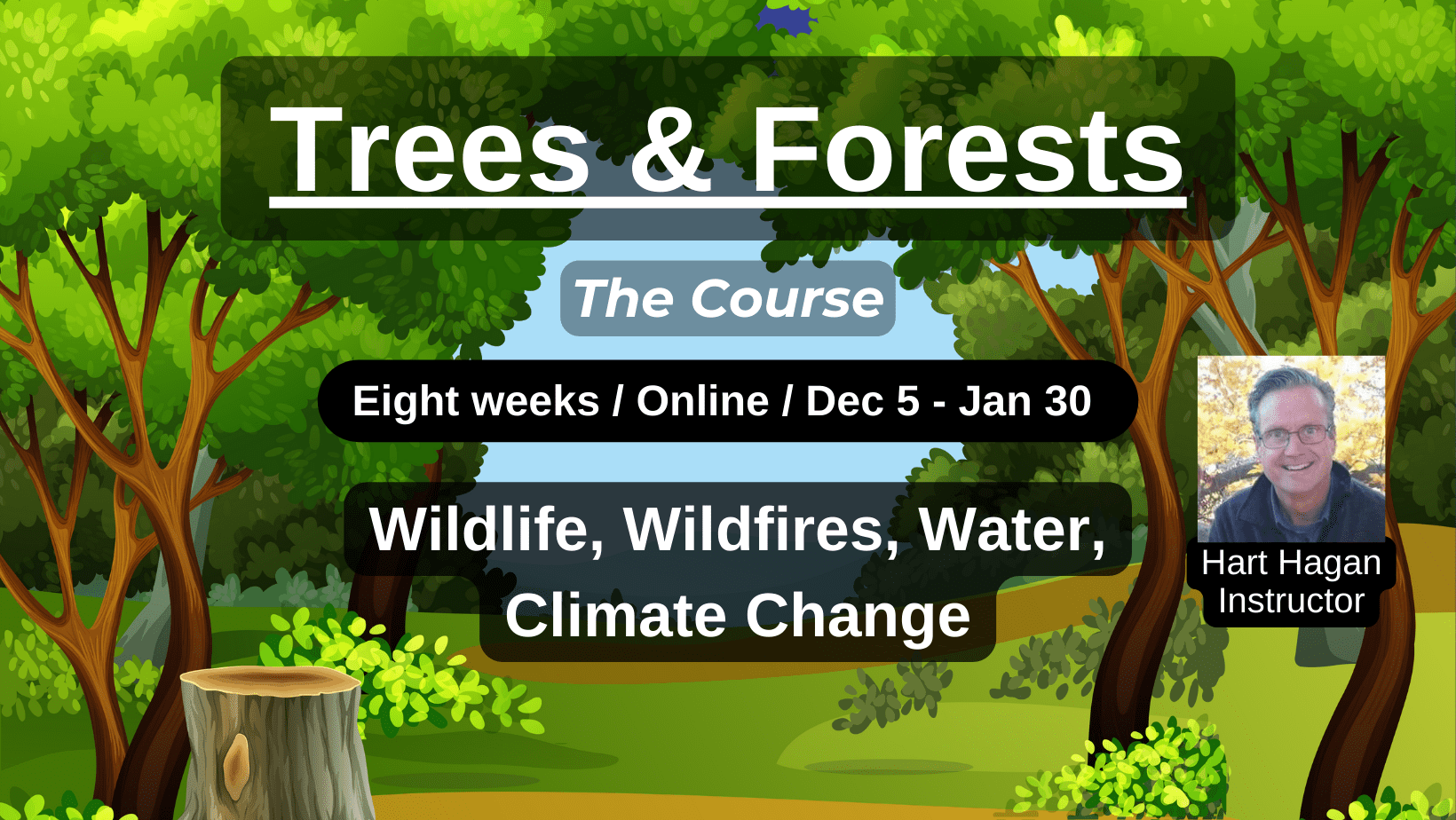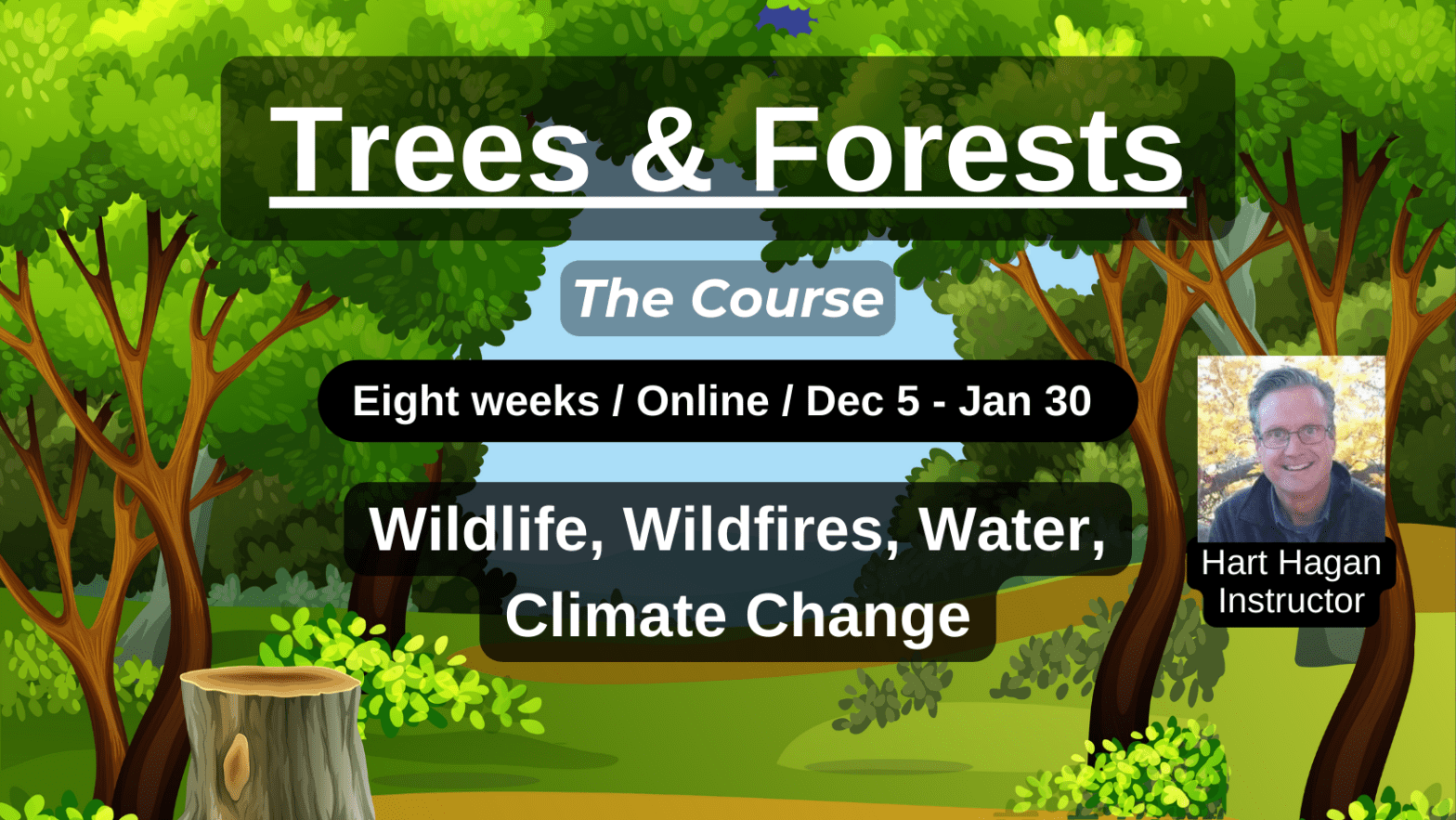Trees & Forests
Wildlife, Wildlife, Water and Climate Change
December 5, 2024 – January 30, 2025
Thursdays: 12 noon -or- 7 pm ET

Course Description
Trees & Forests is an eight week online course (Dec 5 – Jan 30) that explores the many benefits and wonders of our trees and forests, as well as the threats they face.
We will study Trees & Forests from four angles: Wildlife, Wildfires, Water Cycles and Climate Change.
Did you know?
- Forests are home to 80% of land-based species, according to the World Wildlife Fund.
- We have lost 16% of our forests since 2002, according to Global Forest Watch.
- Forests are essential in addressing climate change, not only because they absorb carbon, but because they nurture our water cycles.
We have every reason to preserve our forests. But we need more people who understand our forests, how they work and the threats to them.
We need to understand:
- How our forests work as ecosystems
- How our forests absorb carbon
- How our forests cool our climate by casting shade
- How our forests cool our climate by causing water to evaporate
- How a forest acts as a sponge, absorbing rainfall, so as to prevent both flooding and drought
- How a forest differs from a tree plantation
Learning how our forests work as ecosystems
In this course, you will learn what constitutes a healthy, high functioning forest ecosystem, which is biologically diverse, with many bees, butterflies, birds and small mammals, all of which require insects and their larvae, which in turn require a variety of native trees and dead wood.
Caterpillars are bird food
We will learn the surprising importance of caterpillars. Did you know? Just one pair of Carolina chickadees, each weighing ⅓ oz., require 6,000 caterpillars to raise their young in the spring. If you need 6,000 for one nest of baby chickadees, how much more do you need to support North America’s 2,000 bird species?
Wildfires
We will explore the mythology around wildfires. We will look at the benefits of natural wildfires and the limitations of “prescribed burns.” Did you know that the black backed woodpecker is specifically adapted to thrive in a forest after a wildfire? The same is true of Melanophila beetles.
Dead wood
We will explore the untold story of dead wood. Did you know that a dead tree is home to more species than a living tree? We will explore the value of dead wood as a source of food, water and shelter for myriad insects, birds, mammals and amphibians.
Biomass energy
The “biomass energy” industry cuts down our forests and burns them in place of coal. This is neither clean nor energy efficient. Nor is it smart from a carbon standpoint. Quite the opposite.
Timber industry talking points
We will study timber industry “talking points” so that we can identify them in the media. The timber industry uses terms like “fuel reduction” and “forest thinning” to extract the least flammable trees under the guise of wildfire prevention.
Knowledge is power
The good news is that knowledge is power. The more we know, the more we can teach and advocate. Much of the foul play is from our public officials, who will be responsive when we become aware.
Learn. Do. Teach.
We want to Learn, Do and Teach, then repeat the process. We want to become advocates. If you only want to learn, we have a place for you. But your instructor encourages you to apply your learning by teaching somebody, somewhere, somehow.
Format
- Online via Zoom for 8 weeks
- Thursdays at 12:00-1:30 PM -or- 7:00-8:30 PM (Eastern Time, US)
- December 5, 2024 – January 30, 2025, except Christmas week
- Recordings available to students
- In between classes, connect with the instructor and other students via an exclusive email group
Your Instructor

Hart Hagan is an educator, a native plant expert, and an environmental reporter who has produced nearly 400 radio shows and over 250 videos since 2018. He is the founder of Water & Climate, a Facebook group with over 4,500 members. Six years as a climate reporter has led him to focus on the value of ecosystems and water cycles as a key driver of climate, and the primary means of curbing extinction and providing habitat for our fellow species.
Hart has also studied marketing and communications extensively and currently trains environmentalists and climate activists in a program he calls Practice Your Pitch.
Hart is passionate about educating people that in order to understand flooding, drought, heatwaves and wildfires, we must look beyond CO2 and examine how we treat our land. He is an avid gardener with a focus on native wildflowers and creating landscapes that capture all the rainfall.
To review and subscribe to Hart’s important work, visit his:
YouTube Channel: @harthagan23
Blog on Substack: harthagan.substack.com
Facebook Group: Water & Climate
Whether this is your first course or your tenth course, please join us if you are curious about nature and its power to restore the soil and other ecosystems to abundance. Everyone has much to learn and share, and there is much to be done. We are all on a journey of expanding our knowledge on nature’s climate solutions, and we each bring something valuable to the conversation.
If you have any registration or general course questions, email us at staff@bio4climate.org. If you have specific questions about the course for Hart Hagan, you can contact him at nhhagan@gmail.com.

